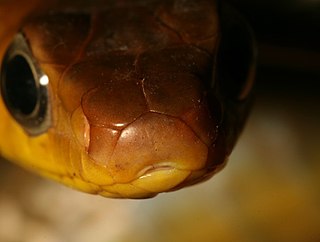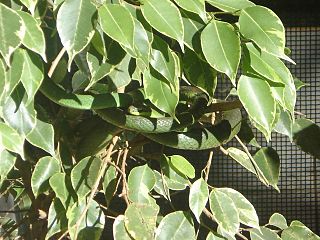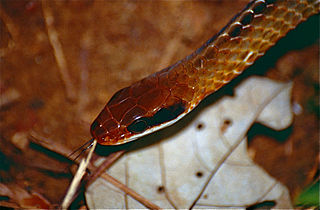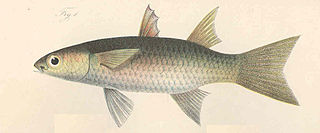
Chironius scurrulus, commonly known as the smooth machete savane, is a large slender colubrid snake. It is also known as Wagler's sipo.

Chironius multiventris, commonly known as the long-tailed machete savane, is species of colubrid snake.

Chironius carinatus, commonly known as the Amazon coachwhip, is a long and slender, nonvenomous colubrid snake.

Chironius is a genus of New World colubrid snakes, commonly called sipos, savanes, or sometimes vine snakes. There are 23 described species in this genus.

Calotes grandisquamis, the large-scaled forest lizard, is an arboreal, diurnal, insectivorous agamid lizard found in the evergreen rainforests of the Western Ghats of India; distributed from Agumbe to Agasthyamalai Hills.
The Saint Vincent blacksnake, also commonly known as the Saint Vincent coachwhip, the San Vincent racer, and Vincent's sipo, is a species of snake in the family Colubridae.

Chironius laurenti is a species of nonvenomous snake in the family Colubridae. The species is endemic to Bolivia and Brazil. The species was named in honor of Raymond Laurent.

Chironius exoletus is a species of snake of the family Colubridae. It is commonly known as Linnaeus's sipo.

The brown sipo is a species of snake of the family Colubridae.

Orcés’s long-tongued bat is a species of leaf-nosed bat found in Ecuador.

The largescaled mullet is a species of ray-finned fish from the family Mugilidae. It is found in the eastern Atlantic from Mauritania to the Gulf of Guinea. It is the only species in the monospecific genus Parachelon.

Chironius flavolineatus, also known as Boettger's sipo, is a vine snake species in the family Colubridae, endemic to savannas and semiarboreal biomes in Brazil, and much of South America. It is listed as least concern on the IUCN Red List since 2014. It is a member of the Genus Chironius which is composed of twenty-two other described snake species. It is nonvenomous, using camouflage or burrowing as a form of defense.

Chironius bicarinatus, the two-headed sipo, is a species of snake in the family Colubridae. The species is found in Brazil, Argentina, Uruguay, and Paraguay.
Chironius challenger is a species of snake in the family Colubridae. The species is found in Guyana and Venezuela.
Chironius flavopictus is a species of snake in the family Colubridae. The species is found in Panama, Costa Rica, Colombia, and Ecuador.
Chironius laevicollis, the Brazilian sipo, is a species of snake in the family Colubridae. The species is found in Brazil.
Chironius leucometapus, the yellow-headed sipo, is a species of nonvenomous snake in the family Colubridae. The species is found in Ecuador and Peru.
Chironius maculoventris, the central sipo, is a species of nonvenomous snake in the family Colubridae. The species is found in Argentina, Paraguay, Bolivia, and Brazil.
Chironius monticola, the mountain sipo, is a species of nonvenomous snake in the family Colubridae. The species is found in Venezuela, Ecuador, Bolivia, and Peru.

Chironius quadricarinatus, the central sipo, is a species of nonvenomous snake in the family Colubridae. The species is found in Brazil, Paraguay, and Bolivia.













